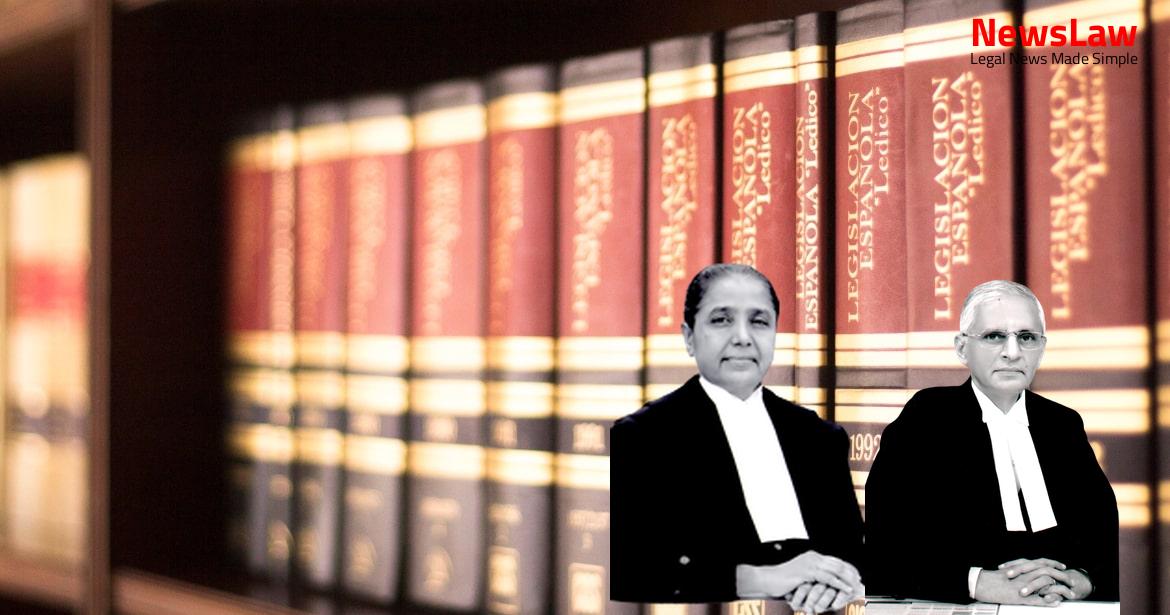The court’s thorough legal analysis on Lok Adalat awards in Land Acquisition cases sheds light on the complexities of compromise and adjudication. This summary dissects the interpretation and application of various provisions under the law to clarify the role of the court in redetermining compensation. Emphasizing the legislative intent behind Section 28A, the analysis underscores the importance of genuine compromises and the limitations of estoppel. Stay tuned to unravel the intricacies within the legal framework governing Land Acquisition disputes.
Facts
- The Additional District Magistrate rejected the applications based on the Lok Adalat award being a compromise.
- Respondents filed applications seeking shelter under Section 28A.
- Lok Adalat awarded compensation at Rs.297 per square yard, differing from the original Rs.20 per square yard fixed by the Land Acquisition Officer.
- Writ petitions were filed by the respondents in response to the compensation difference.
- Fateh Mohammed filed an application for reference against the Award of 1984.
- The reference was made to a Lok Adalat and numbered as 6/02.
- Present Reference filed against Award dated 28.11.1984.
- High Court disposed off appeals by directing Authorities to determine compensation at rate of Rs. 297.50 per sq. yard.
- Both parties voluntarily executed Settlement/Compromise Agreement Paper No 60Ka1.
Also Read: Judicial Analysis on Back Wages in Employee Caste Verification Case
Arguments
- The petitioner contends that the computation of compensation was upheld by the High Court, which was further approved by the Court by dismissing the special leave petition filed against it.
- The petitioner argues that the deeming fiction in Section 21 of the 1987 Act should be limited to the purpose for which it was created.
- He points out that there is a divergence of judicial opinion on the subject among the High Courts.
- The function of the Lok Adalat under Section 19 is essentially to bring about a compromise, not to act as an adjudicatory or judicial body.
- The petitioner emphasizes that the Award of a Lok Adalat, though not a decree as contemplated in Section 28A of the Act, should be seen as an enforceable order of the Court for enhancing compensation awarded by the Land Acquisition Officer.
- Shri V.K. Shukla, learned senior counsel, made similar submissions as the appellant’s counsel.
- He emphasized the facts leading to the Lok Adalat’s Award, including the acceptance of compensation at Rs. 297 per 8 square yard based on the High Court’s judgment.
- He argued that the Award from the Lok Adalat meets the requirements of an application under Section 28A of the Act.
- He highlighted the powers of the Lok Adalat in this matter.
Also Read: Interpretation of Suspension Rules in Employment Case
Analysis
- The analysis section of the judgement delves into the interpretation and application of various provisions of the Land Acquisition Act and the implications of Section 28A.
- It emphasizes the distinction between the role of the Lok Adalat in facilitating settlements through compromise and the adjudicatory functions of a Civil Court.
- The section highlights the necessity of actual adjudication by a court for redetermination of compensation under Section 28A.
- The analysis examines the definition of ‘Court’ under the Act and its significance in the context of award passed by Lok Adalat.
- It discusses the legislative intent behind Section 28A and the requirement for a Court’s decision for invoking the redetermination of compensation.
- Emphasis is placed on the importance of a genuine compromise or settlement in the context of Lok Adalat awards and the limitations of estoppel in such cases.
- The section puts forth arguments regarding the treatment of Lok Adalat awards as decrees or orders of the Court, considering the specific provisions of the Act.
- It concludes by asserting that only adjudication by the Court, as defined in the Act, can serve as the basis for invoking Section 28A for redetermining compensation.
- The Act provides for acquisition of land and compensation.
- The 1987 Act defines ‘case’ as a suit or any proceeding before a court.
- Lok Adalats operate based on principles of justice, equity, and fair play.
- Permanent Lok Adalats are established for certain public utility services.
- Unlike Lok Adalats, Permanent Lok Adalats are duty-bound to decide disputes if parties fail to reach an agreement, provided the dispute is not related to any offense.
- Lok Adalats have no jurisdiction in cases involving non-compoundable offenses.
- The court can refer a case to Lok Adalat if there are chances of settlement or if the matter is appropriate for Lok Adalat’s consideration.
- Lok Adalats must proceed with utmost expedition to arrive at a compromise between parties.
- Lok Adalats have powers similar to a civil court while trying a case.
- A Lok Adalat’s award is final and binding on all parties, and no appeal lies against it.
- Lok Adalats can determine and settle disputes pending before them or falling under their jurisdiction.
- The Lok Adalat is a facilitator of settlement and compromise, not an adjudicator.
- The dismissal of an application filed beyond time under Section 18 does not affect the right to invoke Section 28A.
- Basic principles of statute interpretation were highlighted before delving into Section 28-A.
- The legal fiction of an award under the Lok Adalat being deemed a decree is to facilitate enforcement.
- The purpose of legal fiction should not be extended beyond its creation.
- An award passed by Lok Adalat is treated as a decree capable of execution by a civil court.
- The linguistic clarity of a statute should be adhered to without inserting hypothetical provisions.
- The court’s role is to give effect to the legislative will and purpose behind legal fictions.
- The view taken by the Bombay High Court in Umadevi Rajkumar Jeure (supra) and the learned single Judge of the Karnataka High Court in Vasudave (supra) is approved.
- An Award passed under Section (20) of the 1987 Act by the Lok Adalat cannot be the basis for invoking Section 28A.
- The High Court decision in Mangu Ram was found to be erroneous in regard to the notification under Section (4)
- A review petition has been filed and is pending in relation to the rate of Rs.297.50 per square yard
- The disposal of the case was not considered as ‘the Court’ within the meaning of the Act
Also Read: Legal Analysis of Assignment and Ratification in Property Law
Decision
- The appeals are allowed.
- An application under Section 28A of the Act cannot be maintained based on an award passed by the Lok Adalat under Section 20 of the 1987 Act.
- The impugned judgments are set aside.
- Parties to bear respective costs.
Case Title: NEW OKHLA INDUSTRIAL DEVELOPMENT AUTHORITY (NOIDA) Vs. YUNUS (2022 INSC 142)
Case Number: C.A. No.-000901-000901 / 2022



